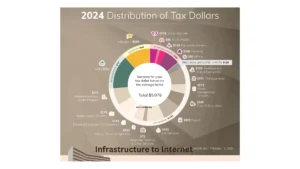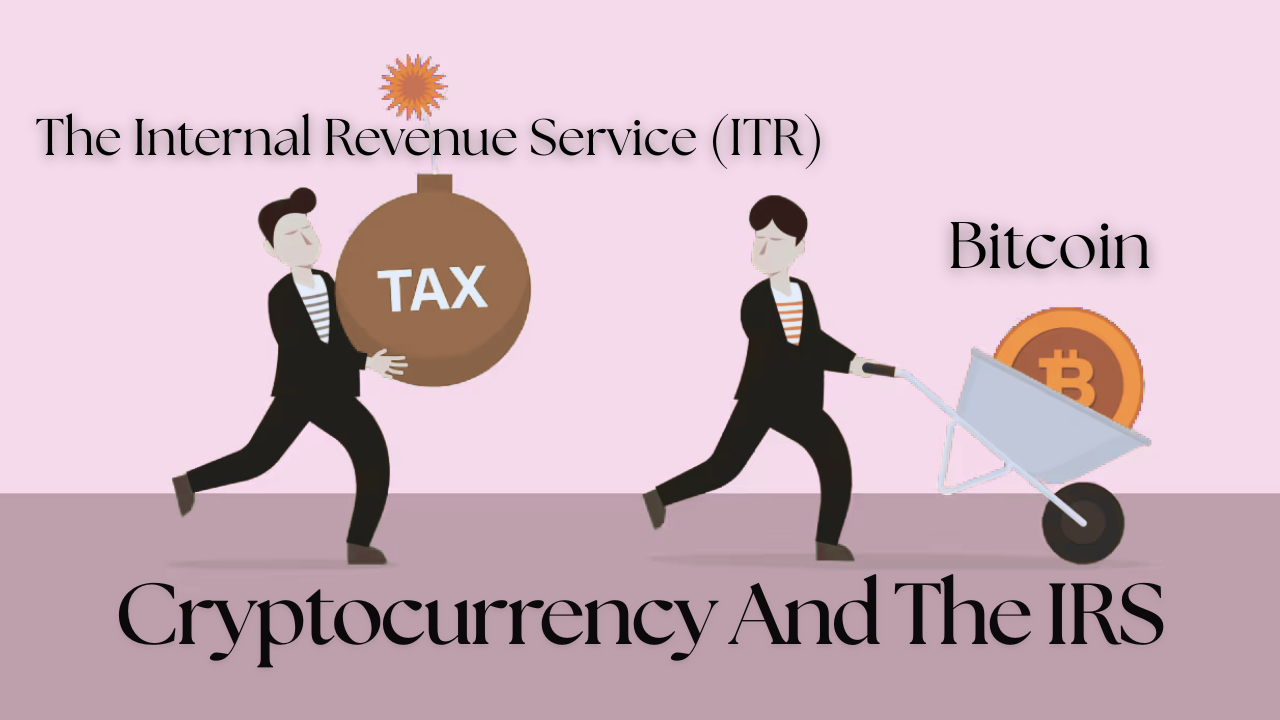The rise of cryptocurrency and the IRS has reshaped modern economics, contributing new investment opportunities and new tax challenges. The Internal Revenue Service (IRS) has been screwing up its grip on crypto transactions, and recent tax rule changes mean investors must stay informed to avoid penalties.

The IRS is oblation with temporary tax relief for crypto investors using centralised exchanges, providing breathing room before harsh 2025 rules come into effect. This would help taxpayers avoid higher liabilities during the transformation. If you’ve bought, sold, or exchanged cryptocurrency, beware: The IRS(The Internal Revenue Service ) is watching the latest tax updates to avoid surprises.
In this guide, we’ll break down the latest IRS crypto tax rules, Big changes for exchanges like Coin base & Binance, Ways to reduce your tax bill legally, and what happens if you don’t report crypto?

Does the IRS Tax Cryptocurrency?
Yes, the IRS manages cryptocurrency as goods, not currency. That means every time you sell, trade, or spend crypto, it could activate a taxable event. The IRS requires all cryptocurrency transactions, which include sales, payments, and other digital asset activities, to be fully and accurately reported on tax returns.
Note :

- No tax is valid until you sell or trade means buying and holding crypto is tax-exempt.
- There is a possibility of tax gains by selling, trading, or spending crypto.
- Extracting or earning crypto as income is Taxable, such as ordinary income.
The IRS has made crypto tax obedience a priority, so failing to report can lead to audits, sanctions, or even legal trouble.

How the IRS Categories Cryptocurrency
For tax purposes, the IRS treats Bitcoin or other cryptocurrencies as goods, not money. That means the tax applied to general property transactions is also applied to cryptocurrencies.

| Types of Cryptocurrencies | |
|---|---|
| Transaction Type | How the IRS Taxes It |
| Buying crypto with USD | Not taxable |
| Selling crypto for USD | Capital gains tax |
| Trading crypto for crypto | Taxable (like selling for cash) |
| Earning crypto (mining, staking, rewards) | Taxable as income |
| Spending crypto on goods/services | Taxable (capital gains apply) |
| Receiving crypto as payment (freelance, salary) | Taxable as income |
Note: The IRS doesn’t see Bitcoin or blockchain currency as “money.” Instead, they’re treated like stocks or real estate for tax purposes.

2025 IRS Crypto Tax Reporting Changes
Cryptocurrency And The IRS tax guidance is processed, and the IRS Revenue plan of action for 2024-28 introduced major changes for 2025, containing wallet-based cost tracking and a new Form 1099-DA for normalised reporting. The IRS is cracking down on crypto tax evasion with new rules:
A. Form 1099-DA: New for 2025
- IRS should be reported by brokers for user transactions like Coinbase, Binance.
- Applies to exchanges, wallets, and payment processors.
- For the 2024 tax year, the form is expected to start in 2025
B. Stricter Enforcement on DeFi & NFTs
- Decentralized finance (DeFi) transactions are under inspection.
- Capital gains taxes may activate NFT sales.
C. Lower Reporting Threshold for Businesses
- If you receive $10,000 & in crypto in a business transaction, you must report it as similar to cash reporting rules.
When Do You Owe Taxes on Crypto?
The Internal Revenue Service (ITR) ,Tax is activated on events like selling crypto for fiat, paying out on goods and services, or earning crypto by mining, staking, etc.
- Sell crypto for fiat in USD, EUR, etc.
- Trade one crypto for another (e.g., Bitcoin to Ethereum)
- Payout crypto on goods/services
- Earn crypto (mining, staking, interest, airdrops)
| Taxes On Crypto | |
|---|---|
| Transaction | Tax Impact |
| Holding crypto | Tax-free |
| Moving crypto between your wallets | Tax-free |
| Airdrops of crypto | Income Tax at your isolated rate, 30% tax if sold later |
| Hard forks | Income Tax at your isolated rate on receipt, 30% tax if sold later |
Example:
- You purchase 1 Bitcoin for $30,000 and put on sell it for $50,000.
- Taxable gain is $20,000
How to Calculate Crypto Tariffs
Calculating crypto taxes involves short-term vs long-term capital gains, or by using crypto tax software, it contain 3 different types of crypto tariffs.
A. Regulated based on Cost
- What you paid for the crypto, counting fees.
- You must choose a method if you bought at different times.
- FIFO (First In, First Out) – former coins are sold first.
- LIFO (Last In, First Out) – Newest coins sold first.
- Specific Identification – Choose which coins to sell (best for tax savings).
B. Short-Term vs. Long-Term Capital Gains
| Holding Period | Tax Rate |
| Less than 1 year | Short-term (same as income tax) |
| More than 1 year | Long-term (0%, 15%, or 20%) |
C. Using Crypto Tax Software
Tools like Koinly, Coin Tracker, or Turbo-tax Crypto can automate calculations by importing exchange data.
How to Report Cryptocurrency on Your Taxes
Report your cryptocurrency capital gains and losses on Schedule D of Form 1040, and use Form 8949 if you need to report individual transactions.
A. Form 8949 & Schedule D
- Used to report capital profits/losses from crypto sales.
- Filed with your Form 1040.
B. Schedule C (For Crypto Income)
- If you earned crypto from mining, freelancing, or staking rewards.
C. FBAR & FATCA (For Offshore Accounts)
- If you hold $10,000+ in crypto on foreign exchanges, you may need to report it.
To Avoid Common Crypto Tax Mistakes:
By following these steps, you can avoid crypto tax mistakes.
- Not reporting crypto-to-crypto trades (the IRS sees these as taxable).
- Forgetting about small transactions (even $10 in crypto spending counts).
- Ignoring DeFi transactions, back-down farming, and liquidity pools may be taxable.
- Assuming losses aren’t reportable if they can offset gains
What Happens If You Don’t Report Crypto?
- There will be an IRS penalty of up to $250,000 in fines or criminal charges for tax avoidance..
- There will be an Audit risk, and the IRS uses blockchain analytics like Chainalysis to track crypto activity.
- If you missed past filings, the IRS offers a way to clean up with sanctions through the Voluntary Disclosure Program.
Tips for Minimising Crypto Taxes Legally
Cryptocurrency is a thrilling expenditure choice, which comes with heavy tax bills; however, there are various ways to deduct the taxes on crypto and keep profits by your side.
- Hold for over a year to qualify for lower long-term capital gains rates.
- Turn investment losses into tax savings by using them to offset your capital gains.
- Use crypto IRAs for tax-free growth (e.g., Bitcoin IRA).
- Donate crypto to charity (no capital gains + tax deduction).
FAQs About Crypto Taxes
If I Don’t Sell Crypto, Do I Have To Report?
Not, if you’re just holding. But trades, income, or spending must be reported.
What If I Lost Money On Crypto?
Report losses, and they can reduce your tax bill
Does the IRS know About My Crypto?
Yes. Exchanges must report user data under new laws.
Can The IRS Track My Wallet?
Yes, the IRS vigorously tracks cryptocurrency wallets
Conclusion
Cryptocurrency taxes are complex, but ignoring them isn’t an option. With the IRS stepping up enforcement, now’s the time to get compliant.




